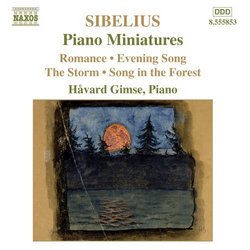| All Artists: Jean Sibelius, Havard Gimse Title: Sibelius: Piano Miniatures Members Wishing: 0 Total Copies: 0 Label: Naxos Release Date: 8/17/2004 Genre: Classical Styles: Chamber Music, Forms & Genres, Suites, Historical Periods, Classical (c.1770-1830) Number of Discs: 1 SwapaCD Credits: 1 UPCs: 747313585328, 747313585328 |
Search - Jean Sibelius, Havard Gimse :: Sibelius: Piano Miniatures
CD Details |
CD ReviewsPleasant Piano Miniatures from the End of Sibelius's Career J Scott Morrison | Middlebury VT, USA | 09/07/2004 (4 out of 5 stars) "No one would ever call Sibelius one of the great composers for the piano. He was trained as a violinist and his piano pieces are awkwardly written for the keyboard player. Further, he never wrote 'big' pieces for the instrument. One wishes he had, for instance, written a piano concerto. What Sibelius did, though, was write miniatures for use in domestic music-making. Consequently, none of his pieces is particularly difficult per se, however unidiomatic the writing may be. Further, he wrote these pieces primarily as a way to make money; there was still, in this era, a huge market for these sorts of pieces. Indeed, these and earlier piano miniatures really helped him out financially during the period of the First World War and the years following when his German earnings were cut off. The music here is not typical Sibelius. Indeed, I would defy anyone to identify the composer in a blind test (and assuming no prior familiarity with them). Still, they are pleasant enough, unfailingly tuneful, occasionally creatively descriptive as such characteristic pieces often are (as, for instance, in 'The Fiddler' and 'The Storm' from 'Five Characteristic Impressions'). The style is somewhat akin to similar kinds of pieces by Grieg or the young Busoni. For what they are, Havard Gimse does a fine job of playing them, hence the four-star rating. This is pleasant music, possibly useful for gentle background music but not much else. They don't hold interest after a time or two. TT=59:11 Scott Morrison" Not the most interesting music, but excellently played G.D. | Norway | 11/30/2008 (3 out of 5 stars) "The fifth volume of Naxos' series of Sibelius' piano music under Håvard Gimse focuses on miniatures from late in the composer's career. For the most part, these pieces were written for domestic use and put up rather modest technical demands. That said, Gimse really plays them for what they are worth and at time almost manages to make them sound like the masterpieces they clearly aren't. Stylistically these pieces are a long shot from what Sibelius was doing for the orchestra at the same time (although it is, with some imagination, for once maybe possible to hear that the composer of the op. 114 set is the composer of the sixth and seventh symphonies).
Sound quality is fine, and anyone who has collected the previous installment in the series need not hesitate. That said, there is no denying that this music is of rather specialist interest, despite some imaginative touches." |

